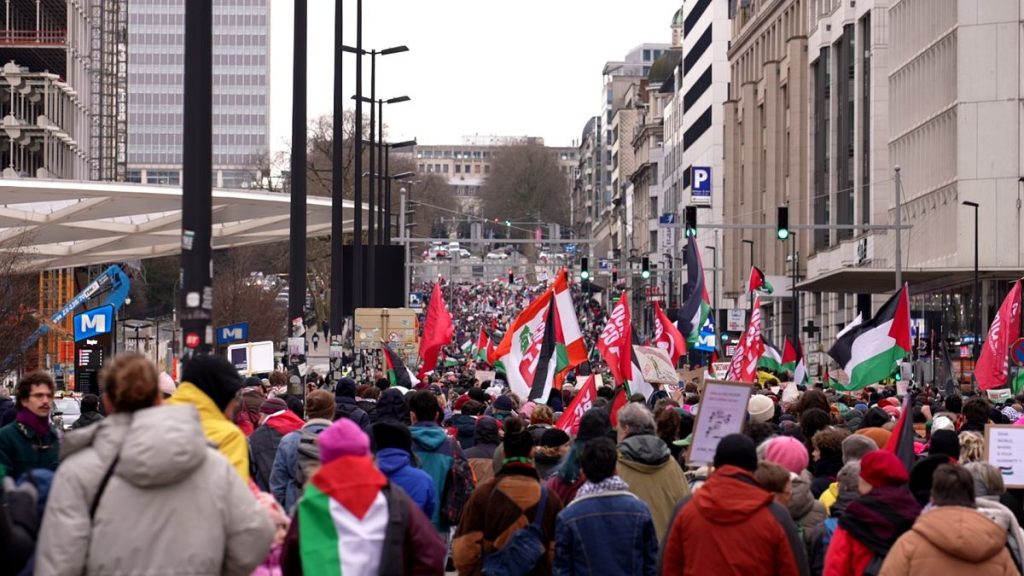A massive demonstration unfolded in Brussels, drawing thousands of participants demanding a lasting ceasefire in Gaza and urging sanctions against Israel. The protestors called for the protection of Palestinians, the release of political prisoners, and unimpeded access to international aid for those grappling with the humanitarian crisis in Gaza. Organizers amplified their demands on social media, advocating for a comprehensive international military embargo on Israel, support for the International Court of Justice’s investigation into Israel’s wartime conduct, and the suspension of the EU-Israel Association Agreement due to human rights violations. The demonstration, organized by a coalition of NGOs, saw participants chanting for Palestinian freedom and an end to the perceived genocide. Many carried placards bearing first names, symbolizing the immense human cost of the conflict, with local authorities reporting over 46,000 Palestinian deaths, mostly civilians, and widespread displacement.
While the recent ceasefire provided temporary relief, protestors emphasized its fragility and the need for a permanent solution. They urged the EU to address the underlying issues in Gaza, not just the immediate aftermath of the conflict. Amnesty International Belgium highlighted the persistent dangers faced by Palestinians in Gaza, emphasizing the necessity of a comprehensive arms embargo against Israel and full support for the International Criminal Court’s investigation. The organization stressed that a lasting solution must address the root causes of the conflict, including the occupation and the alleged apartheid system, to ensure respect for human rights for all in the region. The war has severely hampered Gaza’s development, setting it back decades according to a UN-backed report. While recovery is possible, it requires a comprehensive plan integrating humanitarian aid with strategic investment in reconstruction.
The fragile ceasefire was further strained by incidents preventing Palestinians from returning to their homes in northern Gaza, with Israel accusing Hamas of violating the agreement. Clashes ensued, resulting in further casualties, underscoring the volatile situation on the ground. Israel defended its actions in Gaza as necessary to combat Hamas, claiming its operations targeted the militant group and not civilians. The offensive was initiated in response to Hamas’s cross-border attack into Israel, which resulted in a significant loss of life and the capture of hostages.
As the situation in Gaza appeared to stabilize under the ceasefire, violence intensified in the West Bank. Israeli forces launched a major operation in Jenin, described as exceptionally harsh by local officials, and suspected settlers attacked Palestinian towns. These actions, coupled with the expansion of settlements, are viewed by Palestinians as attempts to consolidate Israeli control over the West Bank. The UN agency for Palestinian refugees (UNRWA) warned of dire consequences if Israel closes its East Jerusalem headquarters, jeopardizing essential services for tens of thousands of Palestinians. The agency, which provides crucial education and healthcare services, faces accusations of Hamas infiltration, which it denies.
Adding to the complexities, newly inaugurated US President Donald Trump rescinded sanctions imposed by the previous administration on Israelis accused of violence in the territory. This move, reportedly prompted by Netanyahu, reverses measures targeting individuals and entities involved in attacks against Palestinians. The presence of over half a million Israeli settlers in the occupied West Bank, considered illegal under international law, further complicates the situation. The violence since the Hamas attack has resulted in a substantial number of Palestinian deaths, fueling tensions and raising concerns about human rights abuses.
Trump further stirred controversy by suggesting that Egypt and Jordan absorb the Palestinian population from Gaza, either temporarily or permanently. He framed the proposal as a solution to the devastation in Gaza, envisioning rebuilding in a new location where Palestinians could potentially live in peace. This suggestion was met with strong opposition from Hamas and Jordan, with both emphasizing the Palestinian right to remain in their homeland. Jordan reaffirmed its rejection of any transfer of Palestinians, while Hamas emphasized the Palestinian capacity to rebuild Gaza. Both countries, despite having peace agreements with Israel, support a Palestinian state in the occupied territories and fear that permanent displacement would undermine this goal. The proposal resonates with some Israeli far-right factions who advocate for Palestinian migration and the expansion of Jewish settlements in Gaza.
Trump’s proposal echoes historical events surrounding Israel’s creation, during which a significant number of Palestinians fled or were expelled from their homes. This displacement, known as the Nakba, remains a central issue in the Israeli-Palestinian conflict. The refugee population and their descendants, now numbering in the millions, reside in various locations, including Gaza, the West Bank, Jordan, Lebanon, and Syria. The issue of their right of return remains a contentious point of disagreement.
The situation in the region remains fraught with tension and complexity. The ceasefire in Gaza is fragile, with ongoing concerns about humanitarian aid access and the potential for renewed violence. The situation in the West Bank remains volatile, with Israeli operations and settler violence exacerbating tensions. The international community faces the challenge of finding a lasting solution that addresses the underlying causes of the conflict and ensures the protection of human rights for all. The Trump administration’s policy shifts, particularly the reversal of sanctions and the proposal for Palestinian resettlement, inject further uncertainty into an already volatile situation. The ongoing violence and displacement, coupled with the political complexities and historical grievances, underscore the urgent need for a comprehensive and sustainable peace process.














